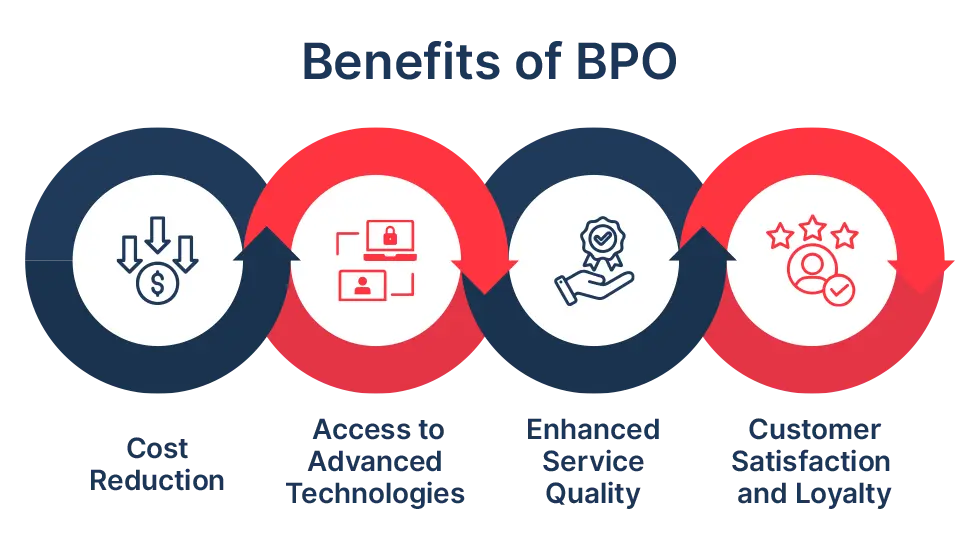Let’s rewind to the turn of the century – the year 2000. As it marked the beginning of a new millennium, people were filled with excitement and anticipation. But soon the excitement was replaced with anxiety because of the Y2K bug. Many experts were panicking because the computer systems would be unable to be operated as the year was saved in the system using the last two digits. So, it would be changing from “99” to “00”, making the year indistinguishable from 1900.
This moment in history served to be a turning point for IT outsourcing, especially for India. US companies worried about the transition, outsourced the work to resolve this bug to Indian companies. They were able to save about 100 billion USD by outsourcing this work.
The Business Process Outsourcing (BPO) sector has come a long way since then. The BPO industry has now emerged as a transformative catalyst, capable of reshaping the fortunes of enterprises. The revenue for the Business Process Outsourcing market is projected to reach a whopping USD 0.37 trillion in 2024.
With such a huge influence on the global economy, BPO continues to evolve and shape the future of many sectors like IT, customer support, human resources, sales, and more.
So, let’s dive into the meaning of BPO, types of BPO, benefits of BPO services, and more.
Read More: BPO Trends Shaping the Future of Call Centers in 2024
BPO stands for Business Process Outsourcing which is a business practice contracting an external service provider to perform specific business functions. These third-party companies, often equipped with advanced technologies, manage a range of tasks, from customer experience services to back-office support operations. Put simply, BPO involves delegating business tasks to an expert third-party enterprise.
The outsourcing of these services helps businesses cut down on operational costs associated with leases, wages, utilities, and other resources. In essence, BPO allows companies to redirect their money, staff, and resources toward refining core competencies, fostering innovation, or expanding services.
Let’s understand the practice through an example. A company decides to outsource its accounting to an external service provider, instead of managing it in-house. This way, the business will benefit from a skilled and experienced team managing financial aspects at a lower cost, compared to maintaining an in-house accounting staff. As the BPO team handles the time-consuming aspects of managing routine accounting tasks, the internal team has the time to focus on business growth initiatives.
BPO stands for Business Process Outsourcing which is a business practice contracting an external service provider to perform specific business functions
For example, a company decides to outsource its accounting to an external service provider, instead of managing it in-house. This way, the business will benefit from a skilled and experienced team managing financial aspects at a lower cost, compared to maintaining an in-house accounting staff.

Know More: Key Benefits of Back Office Support During Peak Holiday Season
Read More: How should you take advantage of BPO for Banking & Financial Services?
The BPO method applies to any enterprise, irrespective of its size, but you need to ensure that the BPO approach aligns with your unique business requirements. Even a solo entrepreneur launching a start-up can harness the benefits of Business Process Outsourcing (BPO). The crux lies in understanding your business requirements and pinpointing areas where external assistance can significantly enhance operations.
With in-house operations, it may take time to develop the expertise and specialization which could affect your business growth. Outsourcing to BPO enterprises that are experts in their specialized domains means that you get a headstart in growing and sustaining your business.
In the end, choosing to work with a BPO isn’t just a smart move; it’s like having a powerful ally by your side that can help your business run better, grow bigger, and succeed faster.
The BPO approach or outsourcing approach is simply one company partnering with another company and handing over certain business operations that were being performed in-house. For example, an enterprise that doesn’t have enough resources for recruiting can outsource the recruitment work to a third party that specializes in this area.
BPO is the strategic approach to delegate business operations to third-party enterprises to save time and money as well as make operations more efficient.
Consider, Bank A which receives huge call traffic to their customer support team. They can outsource their customer support operations to a company that specializes in providing excellent customer service. By partnering with a BPO, they can scale their operations and handle larger call volumes easily.
BPO is a huge sector and the job roles differ with the type of outsourcing work. BPO jobs are usually associated with call center roles like customer support representatives.
People often use BPO and call center interchangeably but BPO and call centers are not the same. A call center is one of the many types of BPO while BPO involves the outsourcing of all functions like HR, Sales, Marketing, and more.
Businesses choose BPO services as they either don’t possess the resources for handling certain operations or they require expert services at cost-effective rates.